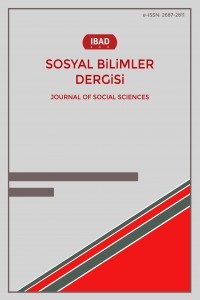Henri Fayol ve Yönetim Alanına Katkıları Üzerine Bir İnceleme
Yönetim süreci yaklaşımı, Fayol ve modern yönetim, Fayol ve Taylor, Fayol ve Mintzberg
A Review of Henri Fayol and His Contributions to Management
___
- Archer, E. R. (1990). Toward a revival of the principles of management. Industrial Management, 32(1), 19-22.
- Baransel, A. (1979), Çagdas Yönetim Düsüncesinin Evrimi, İstanbul: Fatih Matbaası
- Bartol, K. M., Martin, D. C., Tein, M., & Matthews, G. (2005). Management: A Pacific Rim Focus. North Ryde.
- Carlson, S. 1951. Executive Behaviour: A Study of the Workload and Working Methods of Managing Directors. Stockholm: Strombergs.
- Carroll, S. J., & Gillen, D. I. (1987). Are the classical management functions useful in describing managerial work?. Academy of management review, 12(1), 38-51.
- Celik, M., & Dogan, E. (2011). A theoretical approach to the science of management. International Journal of Humanities and Social Science, 1(3), 66-69.
- Duncan, W.J. (1999), Management Ideas and Action, Oxford University Press, New York, NY.
- Eren, E. (1998). Yönetim ve Organizasyon, Beta Yayınları, 4. Baskı, İstanbul.
- Eren, E. (2011). Yönetim ve Organizasyon “Çağdaş ve Küresel Yaklaşımlar”(10. baskı). İstanbul: Beta Basım Yayın.
- Ertürk, M., (1998), İşletmelerde Yönetim ve Organizasyon, 2. Basım, İstanbul, s.6.
- Fayol, H. (2005). Genel ve endüstriyel yönetim. Çeviren: Asım Çalıkoğlu.
- Fells, M. J. (2000). Fayol stands the test of time. Journal of Management History, 6(8), 345-360.
- Godwin, A., Handsome, O. E., Ayomide, W. A., Enobong, A. E., & Johnson, F. O. (2017). Application of the Henri Fayol Principles of Management in Startup Organizations. IOSR Journal of Business and Management, 19(10), 78-85.
- Golden Pryor, M., & Taneja, S. (2010). Henri Fayol, practitioner and theoretician–revered and reviled. Journal of Management History, 16(4), 489-503.
- Gutierrez, Alfonso Carlos Morales, Montes, José Antonio Ariza (2003), “Les idées de Henri Fayol et leur influence en Espagne, durant le 20e siecle:une analyse institutionnelle” J.L. Peaucelle (der.), Henri Fayol, İnventeur des Outils de Gestion içinde, Paris: Economica,, 267-290
- Holmblad Brunsson, K. (2011). Henri Fayol: The man who designed modern management.
- Kotter, J.P. (1982), The General Managers, The Free Press, Macmillan, New York, NY.
- Lamond, D. (2004). A matter of style: reconciling Henri and Henry. Management Decision, 42(2), 330-356.
- Latour, B. (1987). Science in action: How to follow scientists and engineers through society. Harvard university press.
- Mintzberg, H. (1973), The Nature of Managerial Work. New York: Harper & Row.
- Mintzberg, H. (1979), The Structuring of Organizations. Englewood Cliffs, NJ: Prentice Hall
- Mintzberg, H. (1989). Mintzberg on management: Inside our strange world of organizations. Simon and Schuster.
- Örnek, A. (1988), Kamu Yönetimi, İstanbul: Metinler Matbaacılık.
- Parker, L. D., & Ritson, P. A. (2005). Revisiting Fayol: anticipating contemporary management. British Journal of Management, 16(3), 175-194.
- Peaucelle, J. L., & Guthrie, C. (2012). The private life of Henri Fayol and his motivation to build a management science. Journal of Management History, 18(4), 469-487.
- Peaucelle, J. L., & Guthrie, C. (2013). The life of Henri fayol. The Oxford Handbook of Management Theorists, 49.
- Peaucelle, J.L. (2003), “Saint Simon, aux origines de la pense´e de Henri Fayol”, Entreprise et Histoire, No. 34, pp. 68-83.
- Rahman, M. H. (2012). Henry Fayol and Frederick Winslow Taylor’s contribution to management thought: An overview. ABC Journal of Advanced Research, 1(2), 32-41.
- Robbins, S.P., Bergman, R., Stagg, I. and Coulter, M. (2000), Management, 2nd ed., Prentice-Hall, Sydney.
- Rolph, P., & Bartram, P. (1992). How to Choose and Use an Executive Information System. Mercury.
- Sabuncuoğlu, Z., Tokol, T., (2003), İsletme, Bursa:Furkan Ofset.
- Sayles, L.R. 1964. Managerial Behaviour: Administration in Complex Organisations. New York: McGraw-Hill.
- Schermerhorn, J. R., Campling, J. T., Poole, D., & Wiesner, R. (2004). Management: An Asia-Pacific Perspective.
- Simon, H. (1976), Administrative Behavior (3rd ed.), New York: The Free Press.
- Şengül, R. 2007. Henri Fayol’un Yönetim Düşüncesi Üzerine Notlar, Celal Bayar Üniversitesi, Yönetim ve Ekonomi, Cilt: 14, Sayı: 2
- Taylor, F. W. (2005). Bilimsel Yönetimin İlkeleri, Çev. H. Bahadır Akın, İstanbul. Adres.
- Tripathi, P. C. (2008). Principles of management. Tata McGraw-Hill Education.
- Tsoukas, H. (1994). What is management? An outline of a metatheory. British Journal of Management, 5(4), 289-301.
- Wren D.A., Bedeian, A.G. (2009), The Evolution of Management Thought. 6th Ed., John Wiley & Sons.
- Wren, D. A., Bedeian, A. G., & Breeze, J. D. (2002). The foundations of Henri Fayol’s administrative theory. Management Decision, 40(9), 906-918.
- Wren, D.A. (1994), The Evolution of Management Thought, 4th ed., Wiley, New York, NY.
- Yayın Aralığı: Yılda 2 Sayı
- Başlangıç: 2016
- Yayıncı: Hayrullah KAHYA
Dünya’da ve Türkiye’de Doğa Korumanın Kuramsal Temelleri
Coğrafi Bilgi Sistemlerinin Lise Coğrafya Derslerinde Kullanımına Yönelik Bir Uygulama Örneği
Erciş İlçesi Kır Yerleşmelerinin Nüfus Gelişimi (1927-2017) ve Gelişimi Etkileyen Faktörler
İnsani Gelişme Endeksi Ve Türkiye
Ankara’da Ulaşım Sistemlerinin Altında Kalan Dereler: Bentderesi Örneği
Mehtap YILMAZ, Özge YALÇINER ERCOŞKUN
Makyavelizmin İş Yeri Nezaketsizliğine Etkisi: Banka Çalışanları Üzerine Bir Araştırma
Dördüncü Sınıf Öğrencilerinin Akranlarının Problem Çözümlerini Analiz Etme Durumlarının İncelenmesi
Saniye Nur ERGAN, Neşe TERTEMİZ
Ankara-Malazgirt Bulvarı ve Eskişehir Yolu’nun Çukurambar Semtine Çevresel Etkileri
Geleneksel Kastamonu Konut Mimarisinin Cumhuriyet Dönemi Sivil Mimarisine Yansımaları
